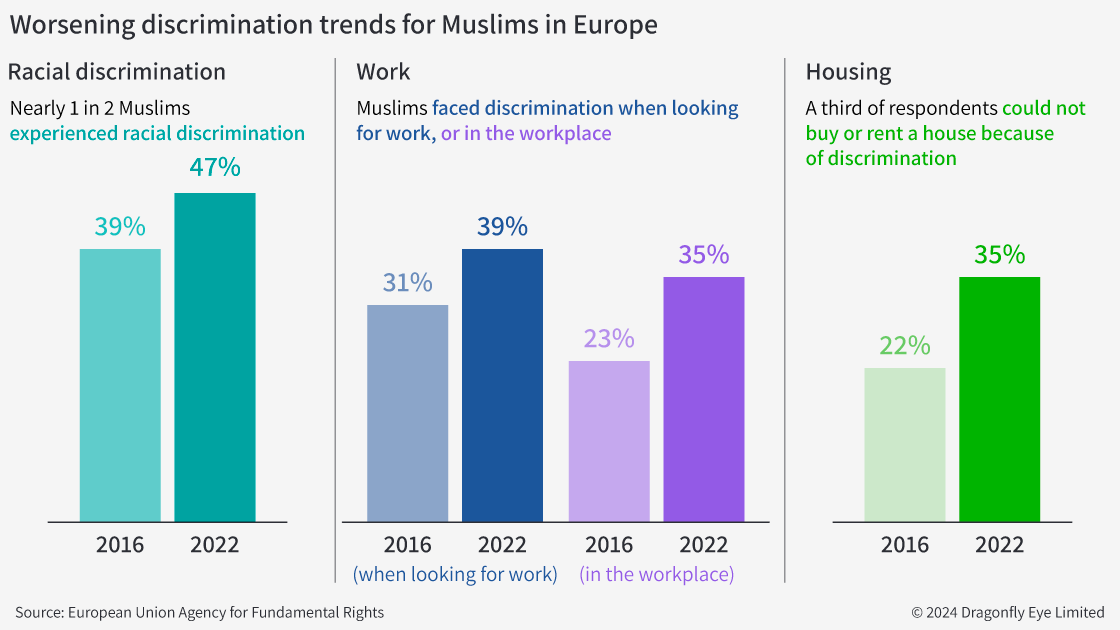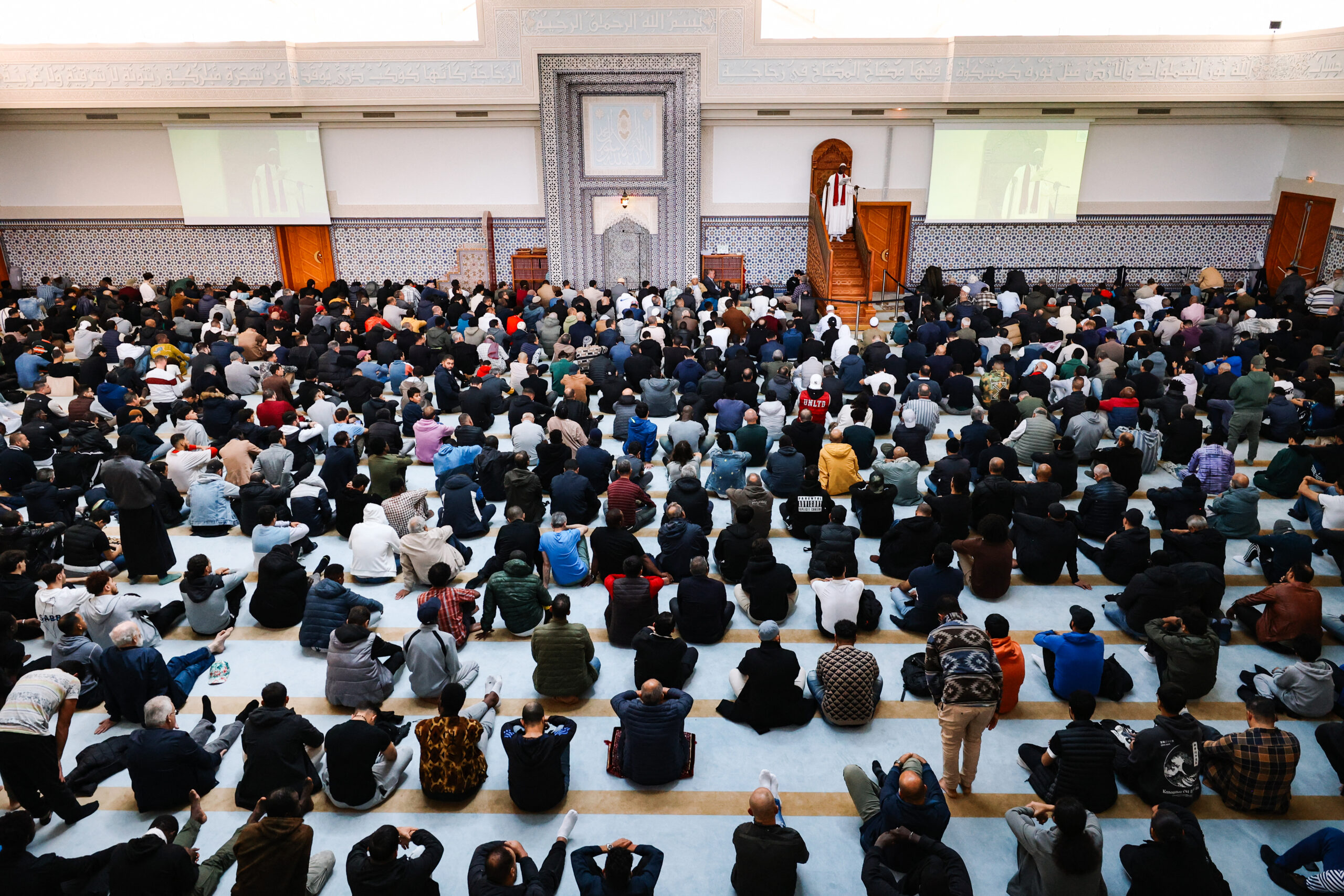Cases of discrimination against Muslims are likely to become more frequent in Europe in the coming years
This assessment was issued to clients of Dragonfly’s Security Intelligence & Analysis Service (SIAS) on 12 November 2024.
- The authorities in France recorded a 30% rise in anti-Muslim incidents in 2023 (the most recent figures) and NGO data from Austria and Germany suggested such cases doubled in the same period
- Public opposition to migration – leading to and galvanised by – the growing popularity of far-right parties will probably continue to drive this trend
Discrimination against those perceived to be Muslim, including in the workplace and verbal harassment, is likely to become more frequent in Europe in the coming years. EU and NGO reporting points to a consistently worsening trend in the past several years. The socio-political context, particularly public opposition to migration and the influence of far-right parties seems to be a significant driver for this. Such parties won a significant minority of votes in Austria (plurality), France and Germany this year. The most probable form of harassment is verbal, any violent attacks would mostly involve vandalising shops and religious sites.
Both data and political climate point to a worsening trend
Discrimination risks appear to be worsening, particularly in northern and western Europe. An EU agency survey released last month reported that nearly half of Muslim respondents in 2022 had experienced discrimination, compared with 39% in 2016. This included harassment, hate crime, and also discrimination in the workplace, the housing market and at school. More recently, reports by governments and NGOs show surging numbers of hate crimes against both Jews and Muslims since the 7 October 2023 attacks on Israel and the war in Gaza.

Opposition to migration (particularly of non-white and Muslim people) among a small but growing portion of the population appears to be a particular driver behind this trend. That is reflected in the popularity of nationalist and extreme and far right-wing parties. Parties that link migrants to crime and strains on the welfare system have in the last few years either won elections or expanded their vote share by several percentage points. In turn, such views have become more mainstream and will probably remain so. That is based on their electoral successes, especially in the last two years in Austria, France, Germany, Italy and the Netherlands.
Highly-publicised violent incidents and disinformation about them almost certainly act as drivers for anti-Muslim and anti-migrant public sentiment. Mass-casualty stabbings in Southport, UK, in July and in Dublin, Ireland, last year prompted violent anti-migrant riots; the authorities largely attributed that response to misinformation online around the identity or motivation of the suspects. And public outcry following a stabbing by a Syrian asylum seeker in Solingen in August seems to have influenced the German government’s decision to impose temporary border controls.
Individuals wearing religious attire more likely to be affected
Discrimination in the workplace, particularly related to career progression, and also while looking for work or housing is likely to be the main form of discrimination for Muslim employees. The EU agency report suggested almost four out of ten participants experienced such issues in 2022, up from around three in ten in 2016. That is the most recent available comprehensive data, but based on our monitoring of cases this appears to still be the case. Muslim women who wear religious clothing (particularly headscarves and face coverings) appear to be especially vulnerable; almost one in two reported being discriminated against when looking for work.
Verbal harassment and vandalism most probable types of hate crime
Verbal harassment, both in public and online, will probably become more frequent in the coming years. Data from several countries suggests there were significant rises in the number of hate crimes targeting Muslims in 2023, with verbal harassment being the most common. The authorities in France recorded a 30% rise in anti-Muslim incidents in 2023 and NGO data from Austria and Germany suggested such cases doubled in the same period.
Targeting often reflects negative stereotypes. People whose skin tone is darker or who are wearing religious or other Muslim-linked attire (such as Palestinian scarves) are particularly likely to be victimised. This is notably in eastern Europe; Muslim and non-white populations are smaller there, which makes people travelling for business more likely to stand out based on their skin colour or clothing.
Islamophobic and anti-migrant protests are also likely to happen fairly often. Although mostly peaceful, small and effectively policed, passersby may feel intimidated or be harassed. And while more riots in the coming years are certainly plausible, particularly following violent crimes attributed to Muslims or migrants, the authorities’ response are likely to prevent those from recurring frequently or lasting more than a few days. The UK authorities charged around 800 people involved in the riots in August.
But we do not anticipate a significant rise in the number of Islamaphobic violent attacks in the next few years. These make up a small portion of recorded hate crime cases (usually around one in ten). The most likely attack type would involve a lone actor or small group physically assaulting individuals based on their skin colour or dress or vandalising Muslim-owned shops and religious sites with spray, stones or petrol bombs. There is also a reasonable chance of sporadic attacks by organised groups in the coming years – but these would remain a small part of overall attacks.
Governments likely to struggle to address deeply-rooted issues
The national authorities will probably struggle to address the causes behind these issues, such as the spread of disinformation, in the coming years. Their actions are often largely reactive, mostly after major bouts of violence, such as the response to the UK riots. Regulating potentially harmful content on social media is also likely to present complex legal challenges. In our analysis, many mainstream political parties will instead focus on winning votes from the far-right by toughening their stance on issues like border security and migration.
Image: Worshippers attend the Friday sermon and prayer (Jumu’ah) at the Grande Mosque (Great Mosque) of Strasbourg, eastern France, on 27 September 2024. Photo by Abdesslam Mirdass/AFP via Getty Images.




